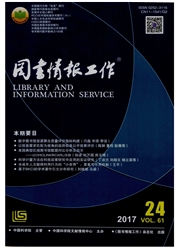

 中文摘要:
中文摘要:
[目的/意义]探究面向决策的“城市病”诊治情报服务模式有利于对“城市病”问题进行综合把脉,帮助城市管理者迅速找准病因、症结,从而提升社会治理效率。[方法/过程]在总结“城市病”诊治相关理论与实践现状的基础上,从宏观环境(信息环境)、中观资源(大数据战略)与用户需求(决策需求)3个层面归纳“城市病”诊治情报服务的推动力,探讨“城市病”诊治情报服务体系的组织架构以及运行机制,指出“城市病”诊治情报服务应是环环相扣、动态演进、递进循环的工程化流程。[结果/结论]情报服务的介入可以促使“城市病”诊治过程更为精细化、系统化与协同化,为政府城市管理与决策提供极为有益的信息决策参考。按照工程化情报服务思维,“城市病”诊治思路将从被动的“应对”向主动的“服务”转变。
 英文摘要:
英文摘要:
[Purpose/significance]The construction of smart cities and the implementation of the big data strategy provide opportunities for the concept innovation of the diagnosis and treatment of the "urban disease". Under this back- ground, the supporting function of the intelligence service in the decision-making processes for the diagnosis and treatment of the "urban disease" is becoming increasingly evident. Exploring the decision-oriented intelligence service on the diag- nosis and treatment of the "urban disease" can give a comprehensive "plus diagnosis" of its problem to help city managers quickly find out the cause of issues and improve the social governance efficiency. [ Method/process ] Based on summing up the interrelated theory and research status of the "urban disease", this paper summarized the driving force of the intel- ligence service on the diagnosis and treatment of the "urban disease" at three levels: the macroscopic environment (the information environment), the medium resources (the big data strategy) and the users' requirements (decision-making requirements). Then, this paper discussed the organization structure and the operation mechanism of the intelligence serv- ice system, and pointed out that the intelligence service on the diagnosis and treatment of the "urban disease" was an en- gineering process which was interlinked, dynamic and cyclically progressive. [ Result/conclusion] With the intervention of the intelligence service, the process of the diagnosis and treatment of the "urban disease" becomes more sophisticated, systematic and coordinated. Besides, it provides the valuable government decision-making reference for urban manage- ment. According to the engineering thinking of the intelligence service, the diagnosis and treatment of the "urban disease" can make a change from the passive "coping" to the initiative "service".
 同期刊论文项目
同期刊论文项目
 同项目期刊论文
同项目期刊论文
 期刊信息
期刊信息
